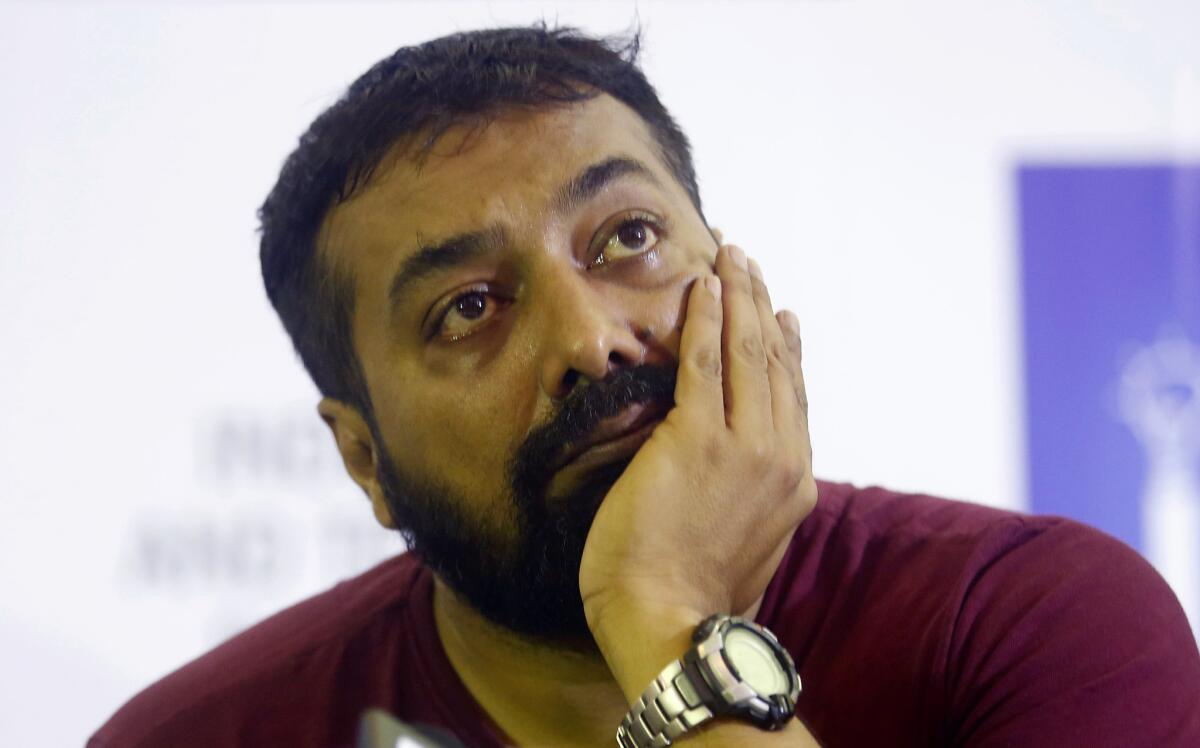What India’s film censors worry about: long kisses, gay themes and now a gritty story about drugs

- Share via
India has long been the world’s biggest moviemaker. Its official censors, too, are proving increasingly prolific.
The national censor board this week said that a big-budget Bollywood film about a gritty, often-overlooked subject — the drug menace in the northern state of Punjab — painted the state in a bad light. The board reportedly has ordered the makers of “Udta Punjab” (“Flying Punjab”) to make dozens of cuts and remove all references to the state, including from the title.
“Our only concern is the entire movie is completely based on Punjab,” Pahlaj Nihalani, the chief of the Central Board of Film Certification, told India’s Economic Times on Wednesday. “All the characters are negative. It will hurt the whole community.”
India’s filmmaking community has rallied in support of the movie. For months, Bollywood’s leading lights have criticized the censor board — charged with determining movies’ suitability for audiences — for behaving like moral police by demanding that salty language, sexuality, gay themes and politically sensitive topics be cut from films.
See the most-read stories this hour >>
Much of the vitriol has been directed at Nihalani, who was appointed censor board chief after Prime Minister Narendra Modi’s conservative Bharatiya Janata Party won national elections in 2014. Nihalani, a successful film producer in the 1990s, was known to be an admirer of Modi’s, having made a campaign song for the Indian leader.
In the latest case, critics accuse Nihalani of bowing to pressure from a Punjab political party, Akali Dal, which runs the state in alliance with Modi’s BJP. The party leadership reportedly objected to the content and title of “Udta Punjab,” which highlights the government’s failure to stop rampant drug abuse in the state bordering Pakistan.
Analysts say Akali Dal is worried about a potential blockbuster film highlighting the seamier side of Punjab being released nine months before state assembly elections are scheduled. The movie is due out June 17 and stars Shahid Kapoor and Kareena Kapoor, two Bollywood A-listers.
The film’s director, Anurag Kashyap, said at a news conference Wednesday that the producers were told to remove all 94 references to the word “Punjab” in the film. Kashyap filed suit challenging the board’s decision and said he still hoped to release the film on schedule without any cuts. A hearing was scheduled in Mumbai on Thursday.
In tweets, Kashyap described Nihalani as “a dictatorial man” and “an oligarch.”
“I always wondered what it felt like to live in North Korea,” Kashyap tweeted. “Now I don’t even need to catch a plane.” Nihalani responded by accusing Kashyap of taking money from a rival political party.
Filmmaker Ashoke Pandit, a censor board member who has been at odds with Nihalani, said he was “hampering the credibility of the board.”
“This is the Talibanization of the industry,” Pandit said in an interview.

For decades, India’s censor board routinely struck sexual content and blue language from films while giving a pass to wanton violence and mistreatment of women. But under Nihalani, the cuts ordered to films — particularly foreign releases that Indians can easily download in their original form — have led to charges that the censors are perpetuating a nanny state.
This year, the American sci-fi film “Deadpool” was shown in India after censors demanded that references to male and female genitalia be removed and a lovemaking scene shortened.
“Spectre,” the latest James Bond film, had a lengthy kissing scene heavily trimmed. Explaining the order, Nihalani prompted mockery when he said such a long kiss “means you want to do sex in your house with your door open. And show to people the way you are doing sex.”
The word “lesbian” was ordered removed from one Indian film, and another, “Aligarh,” about a gay professor, was given an “A” rating — India’s equivalent of an “R” — because of its theme. The filmmakers were furious and accused the censor board of behaving like a “homophobic society.”
“Everybody in the film industry is aghast,” Pandit said, calling the censor board’s conservative bent a “constant distraction for the writer or director.”
In January, the Indian government formed a committee to help restore credibility to the censor board. Among its recommendations, the committee said the board should be allowed to grant audience ratings only and not determine content except in rare circumstances. The recommendations have yet to be adopted.
Supporters of “Udta Punjab” said the film would create awareness of a serious social problem. Pandit argued the film should be granted a tax exemption, saying its subject matter “is in the interest of the country.”
“Watching a film is a voluntary thing,” said filmmaker Sudhir Mishra. “Let the audience be the judge. If we are mature enough to vote, surely we are mature enough to watch all kinds of films.”
Parth M.N. is a special correspondent.
ALSO
Obama pushes Indian prime minister on climate change
22 of the world's most polluted cities are in India
What it's like to live in the world’s fastest growing major economy
Sign up for Essential California
The most important California stories and recommendations in your inbox every morning.
You may occasionally receive promotional content from the Los Angeles Times.








